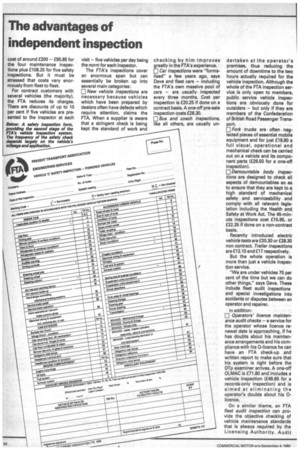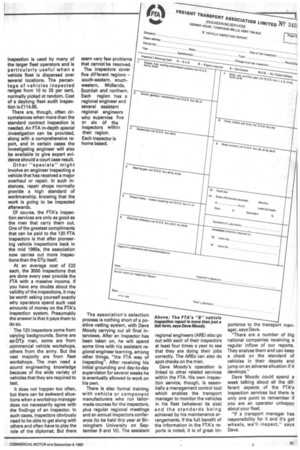The advantages of independent inspection
Page 40

Page 41

If you've noticed an error in this article please click here to report it so we can fix it.
cost of around £200 — £95.85 for the four maintenance inspections plus £108.25 for five safety inspections. But it must be stressed that costs vary enormously from fleet to fleet.
For contract customers with several vehicles (the majority), the FTA reduces its charges. There are discounts of up to 10 per cent if five vehicles are presented to the inspector at each visit — five vehicles per day being the norm for each inspector.
The FTA's inspections cover an enormous span but can essentially be broken up into several main categories:
LI New vehicle inspections are necessary because vehicles which have been prepared by dealers often have defects which require attention, claims the FTA. When a supplier is aware that a stringent check is being kept the standard of work and checking by him improves greatly in the FTA's experience. LI Car inspections were "formalised" a few years ago, says Dave and fleet cars — including the FTA's own massive pool of cars — are usually inspected every three months, Cost per inspection is £20.25 if done on a contract basis. A one-off pre-sale inspection costs £28.30.
LI Bus and coach inspections, like all others, are usually un
dertaken at the operator's premises, thus reducing the amount of downtime to the two hours actually required for the vehicle inspection. Although the whole of the FTA inspection service is only open to members, public service vehicle inspections are obviously done for outsiders — but only if they are members of the Confederation of British Road Passenger Transport.
ID Fork trucks are often neglected pieces of essential mobile equipment and for just £18.90 a full visual, operational and mechanical check can be carried out on a vehicle and its component parts (£26.50 for a one-off inspection).
['Demountable body inspections are designed to check all aspects of demountables so as to ensure that they are kept to a high standard of mechanical safety and serviceability and comply with all relevant legislation including the Health and Safety at Work Act. The 45-minute inspections cost £15.95, or £22.35 if done on a non-contract basis.
Recently introduced electric vehicle tests are £20.30 or £28.30 non contract Trailer inspections are £12.10 and £17 respectively.
But the whole operation is more than just a vehicle inspection service.
"We are under vehicles 75 per cent of the time but we can do other things," says Dave. These include fleet audit inspections and special investigations into accidents or disputes between an operator and repairer.
In addition:
LI Operators' licence maintenance audit checks — a service for the operator whose licence renewal date is approaching. If he has doubts about his maintenance arrangements and his compliance with his 0-licence he can have an FTA check-up and written report to make sure that his system is right before the DTp examiner arrives. A one-off
OLMAC is £71.80 and includes a vehicle inspection (E48.85 for a records-only inspection) and is aimed at eliminating the operator's doubts about his 0licence.
On a similar theme, an FTA fleet audit inspection can pro
vide the objective checking of vehicle maintenance standards that is always required by the Licensing Authority. Audit inspection is used by many of the larger fleet operators and is particularly useful when a vehicle fleet is dispersed over several locations. The percen tage of vehicles inspected ranges from 10 to 25 per cent, normally picked at random. Cost of a daylong fleet audit inspection is £114.65.
There are, though, often circumstances when more than the standard contract inspection is needed. An ETA in-depth special investigation can be provided, along with a comprehensive report, and in certain cases the investigating engineer will also be available to give expert evidence should a court case result.
Other "specials" might involve an engineer inspecting a vehicle that has received a major overhaul or repair. In such instances, repair shops normally provide a high standard of workmanship, knowing that the work is going to be inspected afterwards.
Of course, the FTA's inspection services are only as good as the men that carry them out.
One of the greatest compliments that can be paid to the 120 FTA inspectors is that after pioneering vehicle inspections back in the mid 1960s, the association now carries out more inspections than the DTp itself.
At an average cost of £22 each, the 3000 inspections that are done every year provide the FTA with a massive income. if you have any doubts about the validity of the inspections, it may be worth asking yourself exactly why operators spend such vast amounts of money on the FTA's inspection system. Presumably the answer is that it pays them to do so.
The 120 inspectors come from varying backgrounds. Some are ox-Dip men, some are from commercial vehicle workshops, others from the army. But the vast majority are from fleet workshops. The men need a sound engineering knowledge because of the wide variety of vehicles that they are required to test.
It does not happen too often, but there can be awkward situa tions when a workshop manager does not necessarily agree with the findings of an inspector. In such cases, inspectors obviously need to be able to get along with others and often have to play the role of the diplomat. But there The association's selection process is nothing short of a positive vetting system, with Dave Moody carrying out all final interviews. After an inspector has been taken on, he will spend some time with his assistant regional engineer learning, among other things, "the FTA way of inspecting". After receiving his initial grounding and day-to-day supervision for several weeks he is eventually allowed to work on his own.
There is also formal training with vehicle or component manufacturers who run tailormade courses for the inspectors, plus regular regional meetings and an annual inspectors conference (to be held this year at Birmingham University on September 9 and 10). The assistant regional engineers (ARE) also go out with each of their inspectors at least four times a year to see that they are doing their jobs correctly. The AREs can also do spot checks on the men.
Dave Moody's operation is linked to other related services within the FTA. His own inspection service, though, is essentially a management control tool which enables the transport manager to monitor the vehicles in his fleet (whatever its size) and the standards being achieved by his maintenance arrangements. If the full benefit of the information in the FTA's reports is noted, it is of great im portance to the transport manager, says Dave.
"There are a number of big national companies receiving a regular inflow of our reports. They analyse them and can keep a check on the standard of vehicles in their depots and jump on an adverse situation if it develops."
Dave Moody could spend a week talking about all the different aspects of the FTA's inspection services but there is only one point to remember if you are an operator unhappy about your fleet.
"If a transport manager has responsibility for it and it's got wheels, we'll inspect," says Dave.




















































